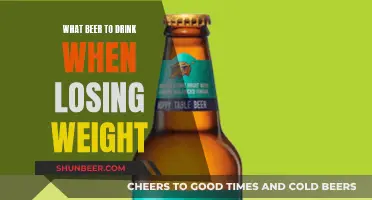
Beer and bodybuilding don't seem like the most compatible duo, but is it possible to enjoy a beer or two and still see results from your training? The answer is yes, but in moderation. While beer is often associated with socialising and relaxation, it's important to remember that it is a source of empty calories and can hinder muscle growth and hydration. On the other hand, moderate drinking has been linked to improved heart health and can enhance social bonding, which may positively impact your fitness routine. So, if you're a bodybuilder who enjoys a beer, it's all about finding a balance and being mindful of the downsides.
| Characteristics | Values |
|---|---|
| Health benefits | Beer is rich in energy-promoting B vitamins and quickly absorbed carbs. |
| Social benefits | Moderate drinking can make you more consistent with your workouts by strengthening your social scene. |
| Hydration | Evidence is not conclusive regarding beer after exercise and hydration, but drinking cautiously will not negatively impact your overall hydration status. |
| Weight gain | Alcohol is a fourth macronutrient, with 7 calories per gram, and can contribute to weight gain. |
| Muscle growth | Alcohol may disrupt muscle protein synthesis and muscle growth. |
| Sleep | Alcohol can interrupt sleep, which is important for muscle growth and repair. |
| Calories | Beer is packed with calories, with an average alcoholic beverage containing 100-200 calories. |
| Detrimental effects | A couple of beers every other weekend would be detrimental only in terms of the calories from it slowing down your cut. |
What You'll Learn

Beer is rich in B vitamins and carbs, aiding fitness routines
Beer has been enjoyed for thousands of years, and while it is made from a wide variety of ingredients, it is considered a fairly nutritious beverage. Beer is rich in B vitamins, which are essential water-soluble nutrients that need to be consumed and replaced daily to maintain good health. B vitamins are responsible for converting food into usable energy, and they also play a role in maintaining red blood cells and a healthy nervous system. A vitamin B deficiency can lead to reduced energy levels and impaired workout recovery. Therefore, ensuring adequate B vitamin intake is crucial for individuals who engage in fitness routines.
The B vitamins found in beer include folic acid (B9), niacin (B3), riboflavin (B2), and vitamin B-6. Each serving of regular beer can provide between 5 and 10 percent of the daily value of these vitamins. While beer is a source of B vitamins, it is important to note that higher amounts of these nutrients can be obtained from other foods and beverages. Additionally, non-alcoholic beer has been found to have several health benefits, such as maintaining electrolyte levels, reducing the risk of osteoporosis in women, and increasing antioxidant levels in breast milk.
Carbohydrates are another essential component of a well-rounded diet, especially for individuals engaged in fitness routines. Carb cycling, which involves adjusting carbohydrate intake over a set interval, is a popular dietary approach. It can help individuals lose fat, maintain physical performance, and support weight loss goals. During training days or intense workouts, higher carbohydrate intake is recommended to meet the body's energy demands and support muscle function.
For bodybuilders and fitness enthusiasts, proper nutrition is crucial for optimising their performance and achieving their fitness goals. The combination of B vitamins and carbohydrates found in beer can contribute to overall nutrient intake, aiding in energy production and supporting bodily functions. However, it is important to consume beer in moderation and be mindful of its caloric content to maintain a balanced diet and avoid potential health risks associated with excessive alcohol consumption.
Beer: A Surprising Remedy for Ethylene Glycol Poisoning?
You may want to see also

Excessive drinking can cause inflammation and liver damage
Excessive drinking can have detrimental effects on the body, particularly when it comes to inflammation and liver damage. Alcohol consumption is one of the leading causes of liver damage, and when this occurs, it is known as alcohol-related liver disease. This disease encompasses three conditions: alcoholic fatty liver disease, alcoholic hepatitis, and alcoholic cirrhosis.
Alcoholic fatty liver disease is the result of excessive alcohol consumption inhibiting the breakdown of fats in the liver, leading to fat accumulation. This condition typically presents no symptoms, but when they are present, they may include discomfort in the liver area and unexplained weight loss. Alcoholic fatty liver disease can be reversed by abstaining from alcohol, although for some individuals, this abstinence must be permanent.
Excessive drinking can also lead to alcoholic hepatitis, an inflammation of the liver caused by alcohol use. When the liver is overloaded with toxins from alcohol, it becomes injured, triggering an inflammatory response. Alcoholic hepatitis may present no symptoms in its early stages, but as the disease progresses, symptoms such as tenderness in the upper right abdomen, a swollen liver, weight loss, and jaundice may appear.
Continued liver damage due to alcohol consumption can result in alcoholic cirrhosis, where healthy liver tissue is replaced by scar tissue. This condition is irreversible and can lead to serious health complications, including high blood pressure in the liver, fluid accumulation in the abdomen, brain damage due to increased toxin levels in the blood, bleeding from veins in the upper digestive tract, and an increased risk of infection.
To prevent and manage these alcohol-related liver conditions, it is crucial to reduce alcohol consumption or abstain completely. Additionally, dietary changes, nutritional supplements, and in some cases, medical treatment may be necessary to support liver health and overall well-being.
Beer and TB Treatment: Is It Safe?
You may want to see also

Alcohol can disrupt sleep quality and testosterone levels
Alcohol can negatively impact sleep quality and testosterone levels in several ways. Firstly, alcohol acts as a sedative, altering sleep architecture by increasing slow-wave sleep and decreasing rapid eye movement (REM) sleep in the first half of the night. This can lead to frequent awakenings and fragmented sleep later in the night, resulting in overall poor sleep quality. Additionally, alcohol interferes with the production and function of testosterone in the body. It can adversely affect the Leydig cells in the testes, which are responsible for producing and secreting testosterone. Heavy alcohol consumption has been linked to reduced testosterone levels in the blood.
The effects of alcohol on sleep and testosterone are complex and vary depending on the amount and frequency of consumption. Occasional and light to moderate drinking may cause a temporary increase in testosterone levels, but larger or more frequent consumption can lead to decreased testosterone production. Genetic factors also play a role, with some individuals experiencing a stronger negative impact on testosterone levels when consuming alcohol.
The disruption of sleep and testosterone levels due to alcohol consumption can have significant consequences. Poor sleep quality can affect physical and mental performance, and insufficient sleep has been linked to various health issues such as impaired immune function and cognitive impairment. Low testosterone levels can lead to reduced sexual desire, erectile dysfunction, decreased energy, and issues with memory, concentration, and sleep.
To mitigate the negative impacts of alcohol on sleep quality and testosterone levels, it is essential to practise moderation and avoid excessive consumption. Seeking medical advice is recommended for individuals concerned about their alcohol intake or potential testosterone-related issues.
Drinking Beer with Smile Direct Aligners: What You Need to Know
You may want to see also

Beer is packed with calories, impacting weight loss goals
Beer is packed with calories, which can impact weight loss goals. With an average of 100-200 calories per serving, beer can quickly add up to a significant number of extra calories, which can hinder weight loss and contribute to weight gain.
The high calorie content of beer is due to its alcohol content, which has seven calories per gram. This means that the more alcoholic a beer is, the higher its calorie content will be. Even light beers can have 60-110 calories per 12-ounce serving, while regular beers can range from 110-150 or even up to 250 calories or more. These extra calories can quickly add up, especially if multiple drinks are consumed in one sitting.
Not only do these extra calories contribute to weight gain, but they can also be stored as fat if not metabolized. This can lead to a "beer belly", which is a common problem for many drinkers, even those who exercise regularly. In addition, alcohol can disrupt muscle growth and protein synthesis, further impacting weight loss and fitness goals.
For those trying to lose weight or build muscle, it is important to consider the calorie content of beer and the potential impact on their goals. While the occasional drink may not completely derail progress, excessive consumption can definitely hinder results. Therefore, it is important to drink in moderation and be mindful of the calorie intake from alcoholic beverages.
In conclusion, beer is a calorie-dense beverage that can impact weight loss goals, particularly for those trying to build muscle or improve their body composition. While the occasional drink may be acceptable, excessive consumption can lead to weight gain, disrupt muscle growth, and hinder overall fitness progress. Therefore, it is important for bodybuilders and those trying to lose weight to be mindful of their alcohol intake and its potential impact on their health and fitness goals.
Beer After Hair Transplant: What You Need to Know
You may want to see also

Drinking can lead to poor food choices and hangovers
Drinking can also result in a hangover, which can further impact food choices and overall health. A hangover can cause headaches, nausea, and dehydration, making it challenging to maintain a healthy diet and workout routine. The body may crave quick sources of sugar, fat, and carbohydrates to alleviate hangover symptoms, which can sabotage a bodybuilder's nutritional plan.
Additionally, alcohol can disrupt sleep quality, which is crucial for muscle growth and repair. Sleep also affects testosterone levels, which play a key role in muscle building. Poor sleep can lead to fatigue, decreased motivation, and impaired recovery, hindering progress in bodybuilding.
The negative effects of drinking on food choices and hangover symptoms can create a cycle that disrupts a bodybuilder's routine and goals. It is important for bodybuilders to be mindful of the potential consequences of drinking and make informed decisions to maintain their health, performance, and desired physique.
To mitigate the impact of drinking, bodybuilders can follow certain guidelines, such as consuming plenty of water before, during, and after drinking alcoholic beverages, opting for higher-quality alcoholic beverages, and avoiding mixed drinks or beer, which tend to be high in calories and sugar. It is also crucial to prioritize sleep and not substitute alcohol for a good night's rest.
Calcium Channel Blockers and Beer: Is It Safe?
You may want to see also
Frequently asked questions
Yes, drinking beer is bad for bodybuilding as it is an alcoholic beverage that negatively impacts body composition, sports performance, and balanced diets. However, drinking in moderation will not completely ruin progress.
Yes, muscle protein synthesis is inhibited even after moderate alcohol consumption. This can lead to more body fat and smaller muscle mass despite intense workouts.
Yes, alcohol saps the body of water, making it difficult to maintain hydration levels during and after workouts.
Yes, alcohol can help you fall asleep faster and sleep more deeply initially, but it reduces high-quality REM sleep, which is essential for muscle growth and repair.
It is recommended to stick to one beer per day for women and two beers per day for men. Anything more than this is considered heavy drinking and can lead to severe health problems.







